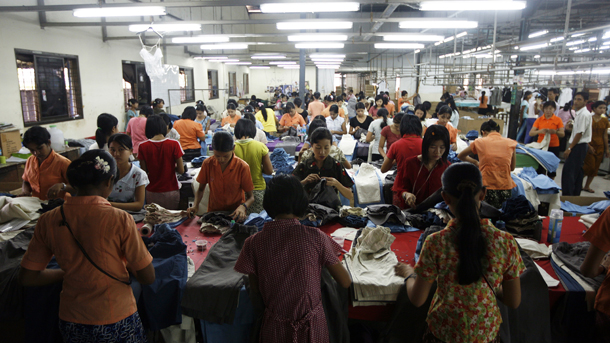RANGOON — Two years of negotiation culminated on Friday with the Burmese government’s approval of a 3,600 kyat (US$2.80) minimum wage for all sectors, to be implemented in September.
The wage, which is low for the region but marks a significant increase for many workers, was welcomed by labor unions and factory owners alike with the exception of the nation’s budding garment industry.
The minimum wage will be applied across industries for all but small and family-owned businesses employing less than 15 people. The final amount was established as a compromise following more than 30 sub-national meetings that pitted factory owners against labor rights advocates.
Garment factory owners came out against the proposed wage in July of this year, many of them threatening to withdraw their investments if the wage were implemented. Labor unions, on the other hand, argued that 3,600 kyats was too low for the mostly female garment manufacturing workforce, which withstands long hours and often lengthy and expensive commutes.
Myat Thin Aung, chairman of Rangoon’s Hlaing Tharyar Industrial Zone, said the compromise has been accepted by most garment factory owners and he was not aware of any impending closures. Only one factory—Asia Roots—will reduce its staff as a result of the new wage, he said.
Some employers do, however, intend to reduce bonuses and rewards for attendance, according to the chairman.
While the wage was ultimately accepted by those on both sides of the debate, Aung Lin of the Myanmar Trade Union Federation told The Irrawaddy that it will likely need adjustment as inflation takes its toll on local consumers.
“When the minimum wage was proposed, the dollar was [valued] at 1,04 kyats,” Aung Lin said, “but now it’s about 1,270.”
According to an assistant supervisor at Toyo Battery Factory, Aung Aung, rising commodity prices could soon make the new wage obsolete.
“It’s likely not enough,” he said. “Although there’s an increase in salary, it cannot cover the rising prices.”

















